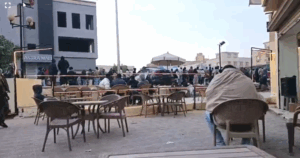New talks about Ethiopian Renaissance Dam
Sudan, Egypt and Ethiopia held a digital meeting yesterday on the negotiations about the filling and operating of the Grand Ethiopian Renaissance Dam (GERD) in the Blue Nile.
 Construction of the Grand Ethiopian Renaissance Dam in 2014 (Jacey Fortin Wikipedia CC BY-SA 4.0)
Construction of the Grand Ethiopian Renaissance Dam in 2014 (Jacey Fortin Wikipedia CC BY-SA 4.0)
Sudan, Egypt and Ethiopia held a digital meeting yesterday on the negotiations about the filling and operating of the Grand Ethiopian Renaissance Dam (GERD) at the source of the Blue Nile.
The three countries adopted Sudan’s proposal to hold bilateral meetings this week, not only between the three countries, but also with a group of experts from the African Union and international observers.
The Sudanese Ministry of Irrigation said in a statement yesterday that the South African Minister of International Cooperation, Naledi Pandor, proposed these bilateral meetings to identify points of agreement and disagreement between the three countries.
The tripartite meetings will resume on Sunday January 10. South Africa chairs the Assembly of the African Union at this moment and is mediating.
Pandor expressed hope that the negotiations can be concluded at the end of January, before the end of the South Africa’s presidency of the African Union.
During the tripartite meeting on Sunday, representatives from Egypt, Sudan, and Ethiopia reviewed their positions regarding reaching a formula that will allow the resumption of negotiations, based on a Memorandum of Understanding proposed by African experts.
Sudan called for defining a clear role for the experts in facilitating the negotiations and proposing solutions on future issues.
In early November, the three countries again failed to reach an agreement about the GERD after a week of negotiations. The Ministers of Water Resources of the three countries agreed to return the file to the African Union.
At the end of November, the Sudanese Ministry of Irrigation and Water Resources announced that the country will withdraw from the current round of GERD negotiations with Ethiopia and Egypt unless a mediation body will be established.
Radio Dabanga’s editorial independence means that we can continue to provide factual updates about political developments to Sudanese and international actors, educate people about how to avoid outbreaks of infectious diseases, and provide a window to the world for those in all corners of Sudan. Support Radio Dabanga for as little as €2.50, the equivalent of a cup of coffee.












 and then
and then